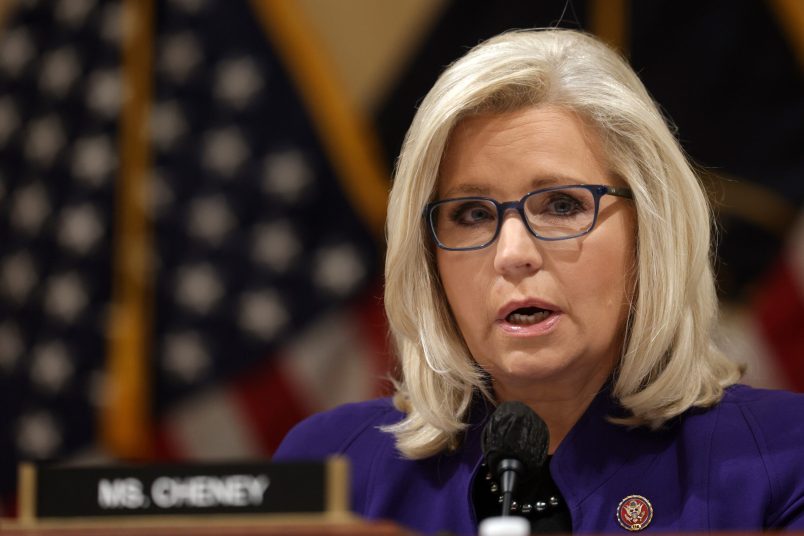Reps. Liz Cheney (R-WY) and Bennie Thompson (D-MS), both of whom chair the Jan. 6 committee, on Sunday said that the panel has heard testimony that offers insight into the communications to former President Trump on the day his supporters breached the Capitol.
Appearing on ABC News, Cheney, who serves as vice chair of the committee, said that the committee has “firsthand testimony” that Trump was sitting in the dining room next to the Oval Office watching TV as the deadly Capitol insurrection unfolded.
After saying that Trump could’ve easily have walked over to the White House briefing room to urge his supporters to halt the attack on the Capitol, Cheney also said that “firsthand testimony” detailed pleas by Trump’s daughter Ivanka and House Minority Leader Kevin McCarthy (R-CA) for the then-President to put a stop to the deadly attack.
“I think it’s also important for the American people to understand how dangerous Donald Trump was. We know as he was sitting there in the dining room next to the Oval Office, members of his staff were pleading with him to go on television, to tell people to stop. We know Leader McCarthy was pleading with him to do that,” Cheney said.
“We know members of his family, we know his daughter. We have firsthand testimony that his daughter Ivanka went in at least twice to ask him to please stop this violence,” Cheney continued, before adding that Trump’s provocation of a violent assault on the Capitol to stop the counting of Joe Biden’s electoral victory shows that the former president “can never be anywhere near the Oval Office ever again.”
Thompson, who chairs the committee, similarly told CNN that the panel has “significant testimony” that the Trump White House had been told to intervene as the then-President’s supporters stormed the Capitol on Jan. 6.
“We want to verify all of it so that when we produce our report and when we have the hearings, the public will have an opportunity to see for themselves,” Thompson said.
Asked if he believes Trump’s lack of action on Jan. 6 warrants a criminal referral, Thompson replied that “it’s highly unusual for anyone in charge of anything to watch what’s going on and do nothing,” before saying that the committee is in the process of gathering more information.
“If there’s anything that we come upon as a committee that we think would warrant a referral to the Department of Justice, we will do that. And that’s our oath as members of Congress,” Thompson said. “So it’s not just that. It’s any of the other things we’re looking at. If there’s any confidence on the part of our committee that something criminal we believe has occurred, we will make the referral.”
Cheney and Thompson’s comments follows Trump’s plea last week for the Supreme Court to halt the committee’s investigation. The former president re-upped his argument that the panel’s investigation is illegitimate by painting the committee’s investigation as an effort by Congress to have him arrested over the Capitol insurrection, telling the court last week that the panel’s real goal is to set the stage for a “criminal prosecution” of the former president.
In a filing on Thursday, the committee cautioned the Supreme court that allowing Trump to block access to White House records would amount to the court extending monarchical power to a former executive.
“Accepting Petitioner’s arguments would result in a remarkable expansion of a former President’s interests—at the expense of the incumbent President’s Article II authority—contravening not only GSA, but also the Constitution,” the panel wrote. “The Constitution’s text and structure reflect the Founders’ rejection of monarchy and perpetual power.”







I think Cheney has plans to run in 7 or 11 years.
I believe she’ll fail.
TFG is going to shit himself, which is exactly the panic that Thomson and the Jan 6 Committee are stoking. “Eyewitness testimony” tells Donnie that somebody from the inner (if not innermost) circle has flipped. He’s going to go ballistic.
One would certainly hope that Liz was simply not thinking it through. Of course Trump was dangerous, the bigger issue is that since the GOP has done nothing but support him he is now even more dangerous.
I’m sure there is plenty meriting criminal referrals…